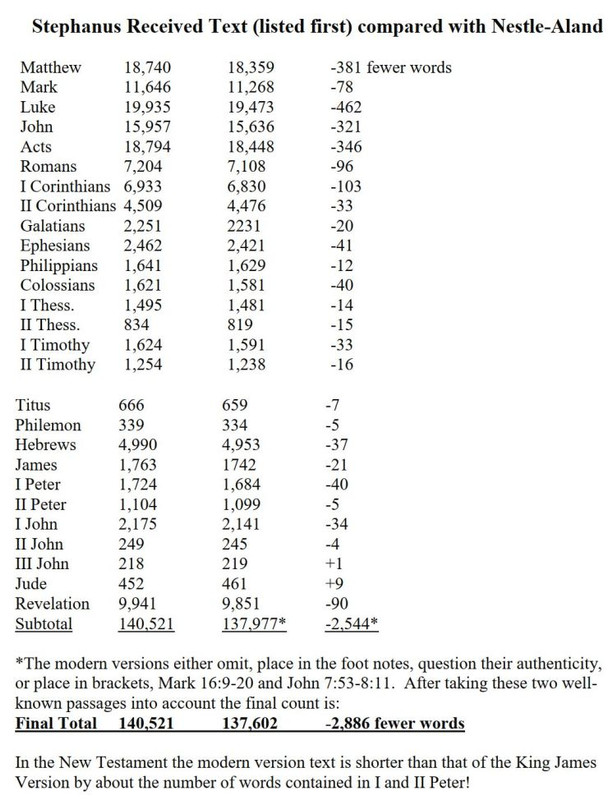Revelation 1:11 (New King James): "saying, 'I am the Alpha and the Omega, the First and the Last,' and, 'What you see, write in a book and send it to the seven churches which are in Asia: to Ephesus, to Smyrna, to Pergamos, to Thyatira, to Sardis, to Philadelphia, and to Laodicea.' "
Revelation 1:11 (Virtually all others): "saying, 'Write what you see in a book and send it to the seven churches, to Ephesus and to Smyrna and to Pergamum and to Thyatira and to Sardis and to Philadelphia and to Laodicea.' "
The Alexandrian manuscripts (2nd example above) are as unreliable as they come.
All you have done is shown a difference between the two. You have provided no evidence as to which is correct. Let's examine a few more verses for some context...
Revelation 1:8-11, compared:
NKJV:
8 “I am the Alpha and the Omega, [
d]
the Beginning and
the End,” says the [
e]Lord, “who is and who was and who is to come, the Almighty.”
9 I, John, [
f]both your brother and companion in the tribulation and kingdom and patience of Jesus Christ, was on the island that is called Patmos for the word of God and for the testimony of Jesus Christ. 10 I was in the Spirit on the Lord’s Day, and I heard behind me a loud voice, as of a trumpet, 11 saying, [
g]“I am the Alpha and the Omega, the First and the Last,” and, “What you see, write in a book and send
it to the seven churches [
h]which are in Asia: to Ephesus, to Smyrna, to Pergamos, to Thyatira, to Sardis, to Philadelphia, and to Laodicea.”
KJV:
8 I am Alpha and Omega, the beginning and the ending, saith the Lord, which is, and which was, and which is to come, the Almighty.
9 I John, who also am your brother, and companion in tribulation, and in the kingdom and patience of Jesus Christ, was in the isle that is called Patmos, for the word of God, and for the testimony of Jesus Christ.
10 I was in the Spirit on the Lord's day, and heard behind me a great voice, as of a trumpet,
11 Saying, I am Alpha and Omega, the first and the last: and, What thou seest, write in a book, and send it unto the seven churches which are in Asia; unto Ephesus, and unto Smyrna, and unto Pergamos, and unto Thyatira, and unto Sardis, and unto Philadelphia, and unto Laodicea.
NIV:
“I am the Alpha and the Omega, [
d]
the Beginning and
the End,” says the [
e]Lord, “who is and who was and who is to come, the Almighty.”
9 I, John, [
f]both your brother and companion in the tribulation and kingdom and patience of Jesus Christ, was on the island that is called Patmos for the word of God and for the testimony of Jesus Christ. 10 I was in the Spirit on the Lord’s Day, and I heard behind me a loud voice, as of a trumpet, 11 saying, [
g]“I am the Alpha and the Omega, the First and the Last,” and, “What you see, write in a book and send
it to the seven churches [
h]which are in Asia: to Ephesus, to Smyrna, to Pergamos, to Thyatira, to Sardis, to Philadelphia, and to Laodicea.”
NASB:
“I am the Alpha and the Omega,” says the Lord God, “who is and who was and who [
g]is to come, the Almighty.”
9 I, John, your brother and fellow participant in the tribulation and kingdom and [
h]perseverance in Jesus, was on the island called Patmos because of the word of God and the testimony of Jesus. 10 I was in
the [
i]Spirit on the Lord’s day, and I heard behind me a loud voice like
the sound of a trumpet, 11 saying, “Write [
j]on a scroll what you see, and send
it to the seven churches: to Ephesus, Smyrna, Pergamum, Thyatira, Sardis, Philadelphia, and Laodicea.”
Given that the same words are said at the beginning of verse 8, it is likely that a copyist inadvertently repeated the line in verse 11.



